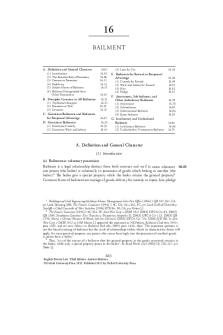Bailment PDF

| Title | Bailment |
|---|---|
| Course | Commercial Law |
| Institution | University of Technology Sydney |
| Pages | 2 |
| File Size | 112.9 KB |
| File Type | |
| Total Downloads | 8 |
| Total Views | 145 |
Summary
Bailment...
Description
Ba i l me nt ‘A bailment comes into existence upon delivery of goods of one person, the bailor, into the possession of another person, the bailee, upon a promise, express or implied, that they will be redelivered to the bailor or dealt with in a stipulated way.’ • Hobbs v Petersham Transport Co Pty Ltd (1971) 124 CLR 220, 238 (Windeyer J) • Bailor: party who gives possession of goods to another • Bailee: takes possession but not ownership of goods • Sub-bailee: takes possession from bailee Type s • Bailment for reward (consideration) • Custody for reward • Hire of work and labour • Hire • Pledge • Gratuitous bailment (no consideration) • Deposit – delivery of goods for gratuitous safekeeping by the bailee • Mandate – delivery of goods for work to be done on the goods without reward • Loan – delivery of goods for use by bailee under gratuitous loan • Note: Special rules apply to common carriers and innkeepers.
Es s e nt i a lEl e me nt s 1. Goods must be delivered to the bailee or possession transferred in some other way 2. Bailee must voluntarily accept responsibility for the goods 3. Bailee must exercise due care and skill in handling the goods 4. Bailee must be under an obligation to return or deliver the goods See Dilan Thampapillai, Claudio Bozzi, Vivi Tan and Anne Matthew, Australian Commercial Law (Cambridge University Press, 2015) 182
Dut i e sofBa i l e e If the bailee is not obliged to return the goods then no bailment has been created – compare contract of sale • No bailment where goods may be substituted (Chapman Bros v Verco Bros & Co (1933) 49 CLR 406 – wheat unmarked, obligation to return equivalent only) • Goods may be returned in changed form • See Pangallo Estate Pty Ltd v Killara 10 Pty Ltd [2007] NSWSC 1528 (contract to transform grapes into wine) • Goods may be delivered to someone other than the bailor under terms of bailment
Bailment 1. (1) How do you define bailment? Explain the difference between Bailment for Reward and Gratuitous Bailment 2. (2) What are some of the rights of a bailee for reward?
The bailee has right to claim proportionate share in mixed goods. ... If the bailee with the consent of the bailor mixes the goods of the bailor with his own goods, the bailor and the bailee shall have an interest, in proportion to their respective shares in the mixture thus produced. Bailments can be either gratuitous or for reward. Bailments for reward include common commercial transactions such as storage of goods, the sale of goods on consignment and the bailment of goods for the purpose of service or repairs
3. (3) When might a bailee be liable for damage to the property? 4. (4) Explain how liability rules may operate for a sub-bailment arrangement. Security Devices and Guarantees (5) List out the various forms of ‘Consumer Finance’ and ‘Business Finance’. (6) What is the difference between a security interest over property and a guarantee? (7) What is the difference between a guarantee and an indemnity?...
Similar Free PDFs

Bailment
- 44 Pages

Bailment
- 9 Pages

Bailment
- 2 Pages

Bailment and pledge
- 26 Pages

Essentials of bailment
- 4 Pages

Bailment and Agency- topic 4
- 14 Pages
Popular Institutions
- Tinajero National High School - Annex
- Politeknik Caltex Riau
- Yokohama City University
- SGT University
- University of Al-Qadisiyah
- Divine Word College of Vigan
- Techniek College Rotterdam
- Universidade de Santiago
- Universiti Teknologi MARA Cawangan Johor Kampus Pasir Gudang
- Poltekkes Kemenkes Yogyakarta
- Baguio City National High School
- Colegio san marcos
- preparatoria uno
- Centro de Bachillerato Tecnológico Industrial y de Servicios No. 107
- Dalian Maritime University
- Quang Trung Secondary School
- Colegio Tecnológico en Informática
- Corporación Regional de Educación Superior
- Grupo CEDVA
- Dar Al Uloom University
- Centro de Estudios Preuniversitarios de la Universidad Nacional de Ingeniería
- 上智大学
- Aakash International School, Nuna Majara
- San Felipe Neri Catholic School
- Kang Chiao International School - New Taipei City
- Misamis Occidental National High School
- Institución Educativa Escuela Normal Juan Ladrilleros
- Kolehiyo ng Pantukan
- Batanes State College
- Instituto Continental
- Sekolah Menengah Kejuruan Kesehatan Kaltara (Tarakan)
- Colegio de La Inmaculada Concepcion - Cebu